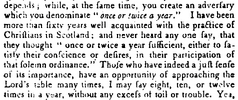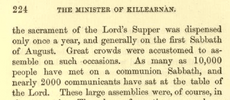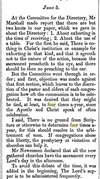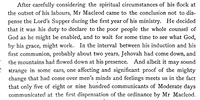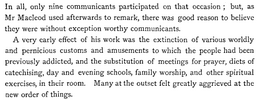proregno
Puritan Board Freshman
With reference to this previous thread:
 www.puritanboard.com
www.puritanboard.com
And specifically Northern Crofter's summary of the different views (daily, weekly, monthly, quarterly and anually), can someone recommend specifically reformed/presbyterian proponents and their works that believed and practiced ANNUAL communion?
There is a lot of sources on weekly and monthly/quarterly communion, but I cannot find many sources on daily and annually views from a reformed/presbyterian view?
Please refer me to any theologains and sources that can help me understand the exegetical-theological case for annual communion , thank you very much.
ps. For those interested, I have done a historical collection and study on the topic for a Reformed Afrikaans church, dealing mostly with weekly and monthly/quarterly views, here are the link and content description ... my own summaries explanations are in the heavenly language Afrikaans ... but most of the sources are quoted in English:
... but most of the sources are quoted in English:
"DOEN DIT, SO DIKWELS: Hoe gereeld moet nagmaalviering plaasvind? deur S. Le Cornu" (English: FOR AS OFTEN: How often should we celebrate communion?)
Contents:
1. Vraagstuk, oorsig en bevinding (Question and summary conclusion)
2. Belydenis, kerkorde en liturgiese formuliere (Confessions, church order and liturgical sources)
2.1) First Book of Discipline of the Church of Scotland (1560)
2.2) Nederlandse Geloofsbelydenis, artikel 35 (1561)
2.3) Heidelbergse Kategismus, vraag en antwoord 77 (1563)
2.4) Heidelbergse Kategismus, vraag en antwoord 103 (1563)
2.4) Die Dordtse Kerkorde, artikels 62, 63, 64 (1618/19)
2.5) The Westminster Directory of Public Worship (1645)
3. Verklarings deur die kerkgeskiedenis tot vandag toe (Question in church history until today)
3.1) Die vroeë kerk en die Reformasie
3.2) Gibson & Earney, Reformed Worship
3.3) J. Calvyn, Institusies
3.4) J. Knox
3.5) Puriteine by Westminter vergadering
3.6) T. Doolittle, Treatise concerning the Lord’s supper
3.7) J. Daille and the Huguenot tradition
3.8) W. a’Brakel
3.9) J. van Lodenstein
3.10) R. Baillie
3.11) JD Du Toit (Totius)
3.12) H. Bavinck
3.13) H. Klaassens
3.14) D.C.S. van der Merwe
3.15) J. Willison
3.16) I.H. Marshall
3.17) A.C. Barnard, Die Erediens
3.18) Orthodox Presbyterian Church (OPC)
3.19) F.N. Lee, Kwartaallikse nagmaalviering
3.20) R.A. Phillips
3.21) B.R. Schwertley
3.22) K.A. Mathison
3.23) K.J. Stewart
3.24) R. Van Neste
3.25) E. Bancroft
3.26) M.S. Horton
3.27) R.C. Barcellos
3.28) A. Kuehner
3.29) S.C. Matthis
4. Kommentare by Hand. 2:42,46; 20:7 en 1 Kor. 11:25, 26 (Commentary sources on important frequency texts)
4.1) Puritan Board
4.2) J. Calvyn
4.3) H. Witsius
4.4) C. Hodge
4.5) J.A. Bengel
4.6) F. Godet
4.7) S.J. Greijdanus
4.8) F.W. Grosheide
4.9) E.P. Groenewald
4.10) F.F. Bruce
4.11) I.L. De Villiers
4.12) F.B. Meyer
4.13) S. Kistemaker
4.14) A.C. Thiselton
4.15) S.C. Mathis
5. Samevatting en konkluderende opmerkings (Final conclusion and recommendations)
6. Bronnelys (Sources for the study)
Frequency of the Lord’s Supper and the Regulative Principle
I have been studying and contemplating the topic of how the “Regulative Principle” applies to the frequency of the Lord’s Supper for many years. I have also long been fascinated by the concept of “time” - the first thing our infinite God did was create this finite concept: “In the beginning.” My...
And specifically Northern Crofter's summary of the different views (daily, weekly, monthly, quarterly and anually), can someone recommend specifically reformed/presbyterian proponents and their works that believed and practiced ANNUAL communion?
There is a lot of sources on weekly and monthly/quarterly communion, but I cannot find many sources on daily and annually views from a reformed/presbyterian view?
Please refer me to any theologains and sources that can help me understand the exegetical-theological case for annual communion , thank you very much.
ps. For those interested, I have done a historical collection and study on the topic for a Reformed Afrikaans church, dealing mostly with weekly and monthly/quarterly views, here are the link and content description ... my own summaries explanations are in the heavenly language Afrikaans
"DOEN DIT, SO DIKWELS: Hoe gereeld moet nagmaalviering plaasvind? deur S. Le Cornu" (English: FOR AS OFTEN: How often should we celebrate communion?)
Contents:
1. Vraagstuk, oorsig en bevinding (Question and summary conclusion)
2. Belydenis, kerkorde en liturgiese formuliere (Confessions, church order and liturgical sources)
2.1) First Book of Discipline of the Church of Scotland (1560)
2.2) Nederlandse Geloofsbelydenis, artikel 35 (1561)
2.3) Heidelbergse Kategismus, vraag en antwoord 77 (1563)
2.4) Heidelbergse Kategismus, vraag en antwoord 103 (1563)
2.4) Die Dordtse Kerkorde, artikels 62, 63, 64 (1618/19)
2.5) The Westminster Directory of Public Worship (1645)
3. Verklarings deur die kerkgeskiedenis tot vandag toe (Question in church history until today)
3.1) Die vroeë kerk en die Reformasie
3.2) Gibson & Earney, Reformed Worship
3.3) J. Calvyn, Institusies
3.4) J. Knox
3.5) Puriteine by Westminter vergadering
3.6) T. Doolittle, Treatise concerning the Lord’s supper
3.7) J. Daille and the Huguenot tradition
3.8) W. a’Brakel
3.9) J. van Lodenstein
3.10) R. Baillie
3.11) JD Du Toit (Totius)
3.12) H. Bavinck
3.13) H. Klaassens
3.14) D.C.S. van der Merwe
3.15) J. Willison
3.16) I.H. Marshall
3.17) A.C. Barnard, Die Erediens
3.18) Orthodox Presbyterian Church (OPC)
3.19) F.N. Lee, Kwartaallikse nagmaalviering
3.20) R.A. Phillips
3.21) B.R. Schwertley
3.22) K.A. Mathison
3.23) K.J. Stewart
3.24) R. Van Neste
3.25) E. Bancroft
3.26) M.S. Horton
3.27) R.C. Barcellos
3.28) A. Kuehner
3.29) S.C. Matthis
4. Kommentare by Hand. 2:42,46; 20:7 en 1 Kor. 11:25, 26 (Commentary sources on important frequency texts)
4.1) Puritan Board
4.2) J. Calvyn
4.3) H. Witsius
4.4) C. Hodge
4.5) J.A. Bengel
4.6) F. Godet
4.7) S.J. Greijdanus
4.8) F.W. Grosheide
4.9) E.P. Groenewald
4.10) F.F. Bruce
4.11) I.L. De Villiers
4.12) F.B. Meyer
4.13) S. Kistemaker
4.14) A.C. Thiselton
4.15) S.C. Mathis
5. Samevatting en konkluderende opmerkings (Final conclusion and recommendations)
6. Bronnelys (Sources for the study)


